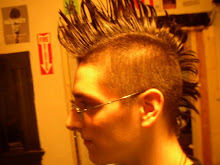Scratch Quantum Program [does it scratch?]
Scratch seems a good new programming language.
It is like moviemaking, which is a totally acceptable low-math application for computers. What do you want to make, anyway? An algorithm that swerves along to music? A story that moves with you? A musical theater with acoustic sets? A first person shooter? A third-person strat? All of these are plastic pieces laid over the chip, which is basically an uncertainty and certainty generator to effect change, to make the plastic dance in a special and funny way.
No one can figure out the original codework of the computer's transistor-level communication. Typing in binary would be 99% fruitless. So we need a different kind of programming language and browsing level. Browsing is almost the same as a programming language in relation to binary.
Binary is the level on which we move to the quantum. The qubit is 'probability'. Who cares about whole 1 or 0 answers. I want quick and shapely probabilities of what the answer might be. Which could come out as a stream of weighted 1's and 0's, or a fraction between 1 and 0 with a weight to it, or a systemed number theory application with the probability reading as its engine. Then with these numbers approached, the question posed is answered to some level of probability and certainty. It's like rolling dice very very quickly, and the software is the meaty RPG story around those dice, or the math lesson around the uncertainty if you're in an application, or just store your own english/01 data.
What is a browser doing, but getting results from an electric box according to the specific and timely will of the user? What is a code language, such as C, doing, except getting results from an electric chip according to the specific and timely will of the user, and passing the information on in a translated way?
Try making a browser that fits right onto binary, or a quantum uncertainty.
Try making a writable programming language that is far easier and less architectural than the number-based languages. A language must be a visual programming. I want a list of all the possible doohickeys I can do in the browser to the programmer, which will be draggable. I want them to be attachable via strings, have a viable start generator, and work through the potentials like a circuit would, or a belt on an engine.
Clearly, there will need to be [bee, iff, -bees] wormholes so the visual process will be easy. You can start a wormhole anywhere, and it blows open a window where the circuit goes, which could be a miniapplication or a conditional verifier. Give me this, google. You CIA summer loving hippies.
It is like moviemaking, which is a totally acceptable low-math application for computers. What do you want to make, anyway? An algorithm that swerves along to music? A story that moves with you? A musical theater with acoustic sets? A first person shooter? A third-person strat? All of these are plastic pieces laid over the chip, which is basically an uncertainty and certainty generator to effect change, to make the plastic dance in a special and funny way.
No one can figure out the original codework of the computer's transistor-level communication. Typing in binary would be 99% fruitless. So we need a different kind of programming language and browsing level. Browsing is almost the same as a programming language in relation to binary.
Binary is the level on which we move to the quantum. The qubit is 'probability'. Who cares about whole 1 or 0 answers. I want quick and shapely probabilities of what the answer might be. Which could come out as a stream of weighted 1's and 0's, or a fraction between 1 and 0 with a weight to it, or a systemed number theory application with the probability reading as its engine. Then with these numbers approached, the question posed is answered to some level of probability and certainty. It's like rolling dice very very quickly, and the software is the meaty RPG story around those dice, or the math lesson around the uncertainty if you're in an application, or just store your own english/01 data.
What is a browser doing, but getting results from an electric box according to the specific and timely will of the user? What is a code language, such as C, doing, except getting results from an electric chip according to the specific and timely will of the user, and passing the information on in a translated way?
Try making a browser that fits right onto binary, or a quantum uncertainty.
Try making a writable programming language that is far easier and less architectural than the number-based languages. A language must be a visual programming. I want a list of all the possible doohickeys I can do in the browser to the programmer, which will be draggable. I want them to be attachable via strings, have a viable start generator, and work through the potentials like a circuit would, or a belt on an engine.
Clearly, there will need to be [bee, iff, -bees] wormholes so the visual process will be easy. You can start a wormhole anywhere, and it blows open a window where the circuit goes, which could be a miniapplication or a conditional verifier. Give me this, google. You CIA summer loving hippies.


1 Comments:
Scratch is a fun little way of programming. Even better is that you can tell a story with it. http://scratch.mit.edu
Post a Comment
<< Home